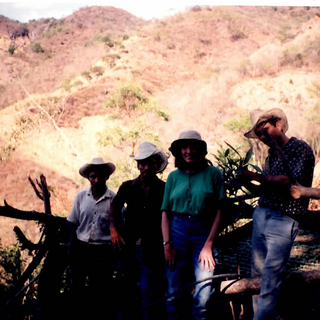Deborah Moskovitz My Peace Corps Experience
- Deborah Moskovitz

- Jan 13, 2018
- 3 min read
I have been reconnecting with my friends from Concepcion, Intibuca, Honduras for the past year and a half. This summer, I received a message from a friend, Miriam. It said that her father, Jenaro, wanted to talk to me. As I asked more questions, I found out that he lived in El Espino, which turned out to be my favorite community of farmers. I eventually talked to Jenaro, and sure enough he knew all the farmers from the group. Imagine my surprise, when I found out that his daughter had married my best friend's son, and they were now living in Pennsylvania! We may be visiting them!
Halfway through service, my Recursos Naturales counterpart introduced me to El Espino. When I met the farmers, we made a large raised bed of radishes that matured in three weeks. We also picked the ground and transplanted tomatoes and peppers onto a hillside. In this group, there were even two women, Juana and a girl named Maria! Jenaro and Arquilino were my two "star farmers". They were willing to do all the hardest jobs, and they always showed up! They even tried to convince me that I should move to El Espino, since they were my most successful group. This would have proven difficult, since I also worked with other people who lived all around Concepcion, but it was a nice thought.
About six months after meeting them, I planned a field trip. The largest group came from El Espino. I secured a grant from USAID in Spanish, so that we could visit three private farms. They observed the new planting processes, ate bread made from Nitrogen fixing beans, and learn how to make a compost pile. USAID paid for us to get there, for the lunch that we ate, and a stipend for each farmer who spoke. The farmers who gave the classes, and the farmers who took them were equally happy with the day.
Once we got home, it was planting season, and we were was very busy. Everyone who went on the field trip wanted to plant using the new ideas. I worked with about four communities around Concepcion, but still the most successful was El Espino. We put in level ditches and barriers to keep soil from slipping down the hillsides. We would take rocks and dead corn husks to make these barriers. All around I went helping people make kilometers of these barriers. I also brought people the nitrogen fixing beans to plant in their red beans to improve the soil, and we made compost piles. Another thing we did was plant less corn seeds in each hole but make the holes closer together.
About a month later, we had a representative from Zamorano Agricultural School come to El Espino for an Integrated Pest Management class. The teacher told everyone about how certain insects eat others, and he gave everyone a plastic bag to collect bugs. I remember when one farmer was very excited to see a spider eating a harmful insect inside his plastic bag! After this class, I sent four farmers including Jenaro and Arquilino to Zamorano for a three day agricultural class. As they, stood up in front of the group at El Espino, they told me how much going on this trip had meant to them, and how it had changed their lives. We were very sorrywhen we said goodbye, but now I've been able to talk to them again after more than twenty years. How wonderful life is!













Comments